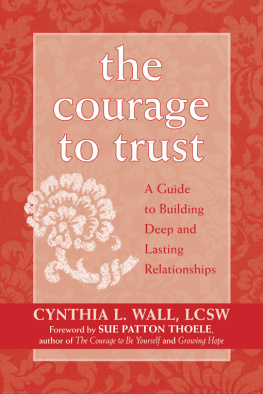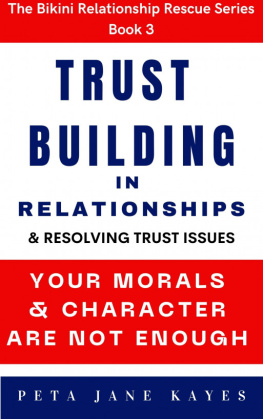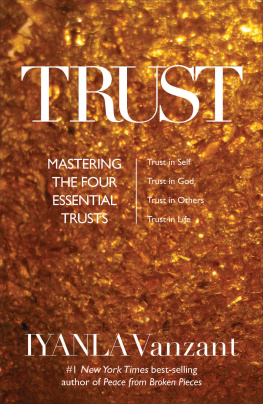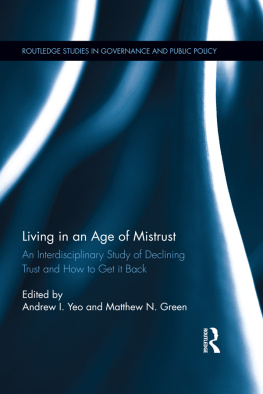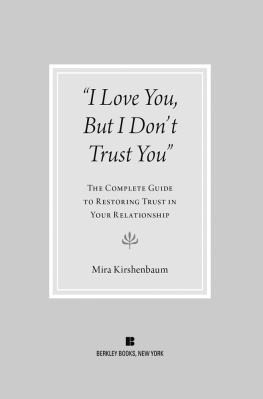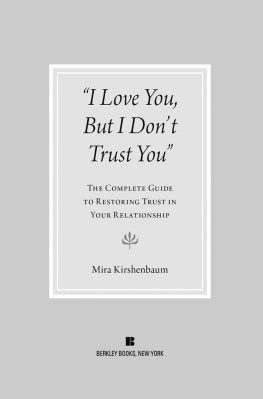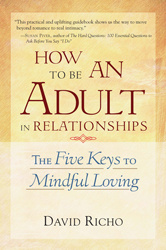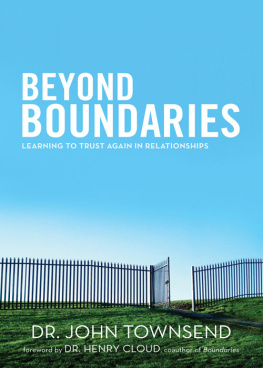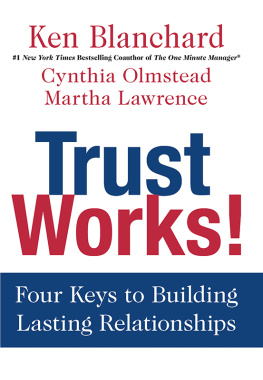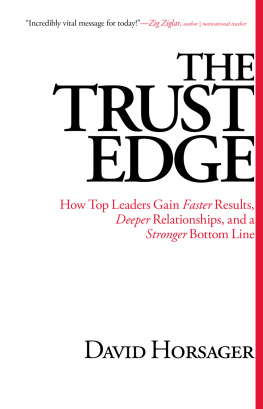
Cynthia Wall, LCSW, earned her masters degree in social work at the University of California, Berkeley, and works in private practice counseling individuals and couples. Her specialty is helping people claim freedom from the limits created by loss and betrayal. She is a volunteer with the American Red Cross and the local hospice in Fort Bragg, CA, where she helps train volunteers and is also involved with the Compassionate Friends, a support group for bereaved parents. A gifted seminar and group leader, she has taught classes in personal growth and self-esteem at the College of the Redwoods in Northern California. Her workshop Trust, Betrayal, and Forgiveness: A Leap of Faith helped her refine the concepts in this book. She has published the ninety-minute audiotape Embracing True Prosperity and leads workshops about the psychological and practical aspects of finance. In her latest workshop, The Courage to Trust, she presents powerful techniques that increase self-trust and trustworthiness and teaches how to trust others more wisely. She lives with her husband of twenty-five years, Marshall Rogers, on the Mendocino coast in Northern California. You can contact Cynthia Wall directly at www.thecouragetotrust.com.
In The Courage to Trust, Cynthia Wall helps us to discover the genuine source of much of our pain and the pain in our relationships and offers us simple, powerful ways to begin to heal it. This wise and beautifully written book is a blessing for every friend, every parent, every lover and every human being.
Rachel Naomi Remen, MD, clinical professor of family and community medicine at the University of California, San Francisco, School of Medicine; medical director of the Commonweal Cancer Help Program; and author of Kitchen Table Wisdom and My Grandfathers Blessings

Publishers Note
This publication is designed to provide accurate and authoritative information in regard to the subject matter covered. It is sold with the understanding that the publisher is not engaged in rendering psychological, financial, legal, or other professional services. If expert assistance or counseling is needed, the services of a competent professional should be sought.
Copyright 2004 by Cynthia Wall
New Harbinger Publications, Inc.
5674 Shattuck Avenue
Oakland, CA 94609
The excerpt from Emily Leiders Friends No More was reprinted with permission from the author.
Sascha Wagners poem was reprinted with permission from Alice J. Wisler/LARGO newsletter.
Cover design by Amy Shoup
Acquired by Melissa Kirk
Edited by Brady Kahn
Text design by Tracy Marie Carlson
epub ISBN: 9781608823086
Distributed in Canada by Raincoast Books
All Rights Reserved
New Harbinger Publications Web site address: www.newharbinger.com
Contents
Foreword
The ability to trust provides the bedrock for emotional security and peace of mind. Being trustworthy is the foundation of personal integrity. Why is such an essential quality often so difficult to find and so easy to lose? Thankfully, within the pages of The Courage to Trust, author Cynthia Wall gives readers sound answers to that question. She also provides countless tools to help you embrace trust and strengthen your ability to be trustworthy.
As a psychotherapist in private practice for over twenty-five years, I have worked with many clients who needed to establish or reestablish a sense of trust within themselves and in their lives in general. Many had been severely wounded by abuse, betrayal, and loss. However, even when spared such soul-searing experiences, many of usmyself includedstill find ourselves growing into adulthood with only a tenuous and intermittent grasp on trust. Why is that?
Trust is hard to come by because it is both learned and earned. As children, we are given mixed messages that confuse us. For instance, were expected to automatically trust people such as our parents, but they can let us down and even lie to us. When a child senses her mom is upset, asks whats wrong, and is told, Nothing!!! Now leave me alone ... she will learn to doubt her own perceptions. She may also begin to believe something is wrong with her and that her feelings are flawed. As kids, we simply dont have the emotional or intellectual experience to say, Ah ha! Mother is not telling the truth right now in hopes of sparing me the pain of knowing shes not happy today! Because a childs safety and security depend on the big people in their lives, its natural for them to trust adult perceptions over their own. And so begins the habit of mistrusting ourselves.
As a mother of four adult children, I have a long list of things I wish Id done differently and actually could do differently were I parenting now that Im older and more experienced. I did the best I could at the time and, looking back, know that my best was sometimes lousy. Because of my own regrets and those shared by clients, I sincerely believe that most parents love and care for their children to the best of their abilities a vast majority of the time. Nonetheless, were all human and, out of ignorance and fear, we all make mistakes. One result of our own and others mistakes is learning not to trust anyone, neither ourselves nor others.
Without trust, life is scary. Behind every experience lurks the fear of crisis, chaos, and calamity. How can we transform fear or act in spite of it? For me, the best way to keep fear from becoming a debilitating force in my life is to believe that I can survive whatever comes my way, learn from it, and move on to greater awareness. Believe me, there are times when I still run from fear, doubt myself, and assign blame to others rather than accepting responsibility. But many, many years of choosing to learn to trustespecially the art of self-trustand consciously moving back into my heart, where trust resides, allows me to tame fear, regain equilibrium, and once again feel safe, secure, and confident.
Contrary to what you may believe, first and foremost, it is essential to learn to trust your self. From the deep commitment not to betray, belittle, or undermine yourselfor if you do, move back to self-love and care immediatelycan flow the certainty that there is one person you can always count onyourself. That certainty will strip power from many of your fears. Knowing you are your own best friend and greatest emotional support helps you face the vicissitudes of life with aplomb and exuberantly embrace joy when it sings in your heart. However, you only have the power to assure your own trustworthiness. Everyone else is in charge of his or her trustworthiness.
Because of our own emotional wounds, fears, and limiting or erroneous beliefs, we may be in the habit of trusting others unwisely or without thought. On the other hand, due to conscious or unconscious vulnerabilities and past betrayals, we may barricade our hearts and refuse to trust anyone no matter how trustworthy they may actually be. Neither pattern of behavior brings peace of mind nor solace of heart. Each sets us up for loneliness. Many of the exercises in The Courage to Trust are designed to help you uncover and heal the emotional triggers that impel you to trust impulsively or withhold trust altogether. Cynthia helps you learn self-trust and offers many ways in which you can allow others to earn your trust in them.
Trust in ourselves and others gives us the courage and capability to create meaningful and lasting relationships. Over time, significant relationships will encompass devotion and disappointment, support and abandonment, joy and grief. Becoming a trustworthy friend to ourselves helps us choose relationships that are right for us and weather the times when even right relationships feel wrong. Being able to trust ourselves completely makes us better friends, lovers, parents, and acquaintances. I believe that we have a deep and holy hunger for sacred partnership in close relationships. Mutual trust must exist between participants in order for any relationship to become a sacred, cherished partnership.

